Are you sick of dealing with your home always being humid and muggy during the summer? A dehumidifier is an excellent solution for controlling indoor humidity and avoiding issues with mold and rot. Dehumidification can also greatly improve your comfort by allowing your air conditioning system to work more efficiently. Here’s a look at why whole-home dehumidifiers are the best choice and what factors affect what size dehumidifier you need.
Limitations of Portable Dehumidifiers
While portable dehumidifiers have their uses, they aren’t an effective solution for controlling humidity issues throughout an entire house. To do that, you’d need to have a unit running in every room. Most portable dehumidifiers use around 200 to 300 watts of electricity per hour of running time, but larger units can use 600 watts or more. That means your electricity bill would increase quite a bit if you had multiple portable units running frequently throughout the day.
The fan in portable dehumidifiers isn’t all that powerful, either, which means the units can only effectively dry the air in the immediate surrounding area. If you only had one or a few portable units in various parts of your house, they wouldn’t be as effective and would need to run more frequently. Your HVAC system will continue moving moisture-laden air into each room when it runs until the portable units finally capture enough moisture to sufficiently dry the air in the house.
With portable dehumidifiers, you must regularly remove and empty the water reservoir. If you forget and the reservoir gets full, the unit won’t run any longer until you empty the reservoir to ensure it doesn’t overflow.
Why a Whole-Home Dehumidifier Is the Most Effective Option
If you want to overcome systemic issues with high humidity throughout your house, a whole-home dehumidifier is the only effective option. Whole-home units are installed within a central HVAC system’s ductwork. This unit will then capture moisture from the air coming into the HVAC system so that the air the system blows into every room is less humid and more comfortable. It also improves the effectiveness and energy efficiency of your HVAC since humid environments tend to feel warmer. In other words, you can keep your AC set at a higher temperature and still feel comfortable.
You don’t necessarily have to connect a whole home unit to your HVAC, either, such as when you’re tackling a damp basement. Nonetheless, you’ll get much better results and your dehumidifier will not need to run as much if it’s connected to your ductwork. In either case, it’s always best to choose a unit that has a built-in humidistat or to control it with a smart thermostat that also serves as a humidistat. If you just run the unit on a timer, you could still end up with your home being too humid or too dry. A humidistat works by measuring the humidity level in the home so that the dehumidifier only ever runs when it needs to. Another advantage of having a humidistat is that it enables you to run your dehumidifier even when your air conditioning is off. If the humidistat is connected to your thermostat, it can automatically signal the HVAC blower and the dehumidifier to run any time the humidity level rises above a set percentage.
Another advantage of having a whole-home unit is that it requires very little maintenance since the unit is installed so that a pipe connects it to your plumbing. That means you never have to dump the water out since all of the water the unit collects just drains straight away.
Whole-home units are also larger and more powerful than portable units, which allows them to capture more moisture per minute. On average, a fairly efficient whole-home dehumidifier will use around 600 to 1,000 watts of electricity per hour of running time depending on its size. That means your energy costs will typically be lower than if you had multiple smaller portable units or sometimes even two larger portable units. Whole-home units work more efficiently and typically won’t need to run for as many hours in a day, which will help you save even more on your energy bills.
How to Determine What Size Whole-Home Dehumidifier You Need
Three primary factors determine what size whole-home dehumidifier a house needs to effectively keep it from being too humid. The first and most obvious factor is the total square footage of all of the home’s living spaces. Another key factor is where you live: You will need a larger, more powerful humidifier in more humid local climates.
The third factor is usually the most important one, and that is how well-sealed your home is against air leaks. When discussing air sealing, what we’re referring to is how many gaps there are in the home’s exterior structure that allow moist air to enter the home. Older homes usually need a larger dehumidifier since many of them are poorly sealed, and they may have cracks in the foundation, resulting in much more humid air continually flowing inside. If you have a newer home that is well sealed or you’ve taken steps to improve your air sealing, you generally won’t need quite as large of a dehumidifier as those with older or leaky homes.
If your home is poorly sealed, consider having it air-sealed before installing the dehumidifier. If you don’t, you’ll need a much larger unit that will use more energy. This is why, if you’re considering installing a whole-home dehumidifier, an HVAC company can be your best ally. We can perform what’s known as a blower door test to determine how much air leakage your home has.
A blower door test involves completely sealing up an exterior door with a panel that has a large industrial fan. When the fan runs, it pulls air out of the house to create negative air pressure. An air pressure gauge on the blower door then measures how much negative pressure the fan creates. If the home is poorly sealed, the fan won’t create as much pressure since it draws quite a bit of air in from outside through the various structural gaps. The pressure the gauge reads then allows the HVAC technician to calculate the home’s air leakage in terms of cubic feet per minute.
Childers Air Plumbing & Electric has been serving Beckley, WV and the surrounding areas since 1951, and we’re ready to handle all of your home comfort, electrical and plumbing needs. We specialize in whole-home dehumidifier and humidifier installation and can ensure you can effectively control your home’s humidity level all year round. You can also count on us if you’re looking for other options to improve your home’s indoor air quality or want to have a home energy audit performed to find ways to save on energy bills and improve your home’s energy efficiency. For more information on the benefits of installing a whole-home dehumidifier or to schedule any other home service, contact the experts at Childers Air Plumbing & Electric today.

